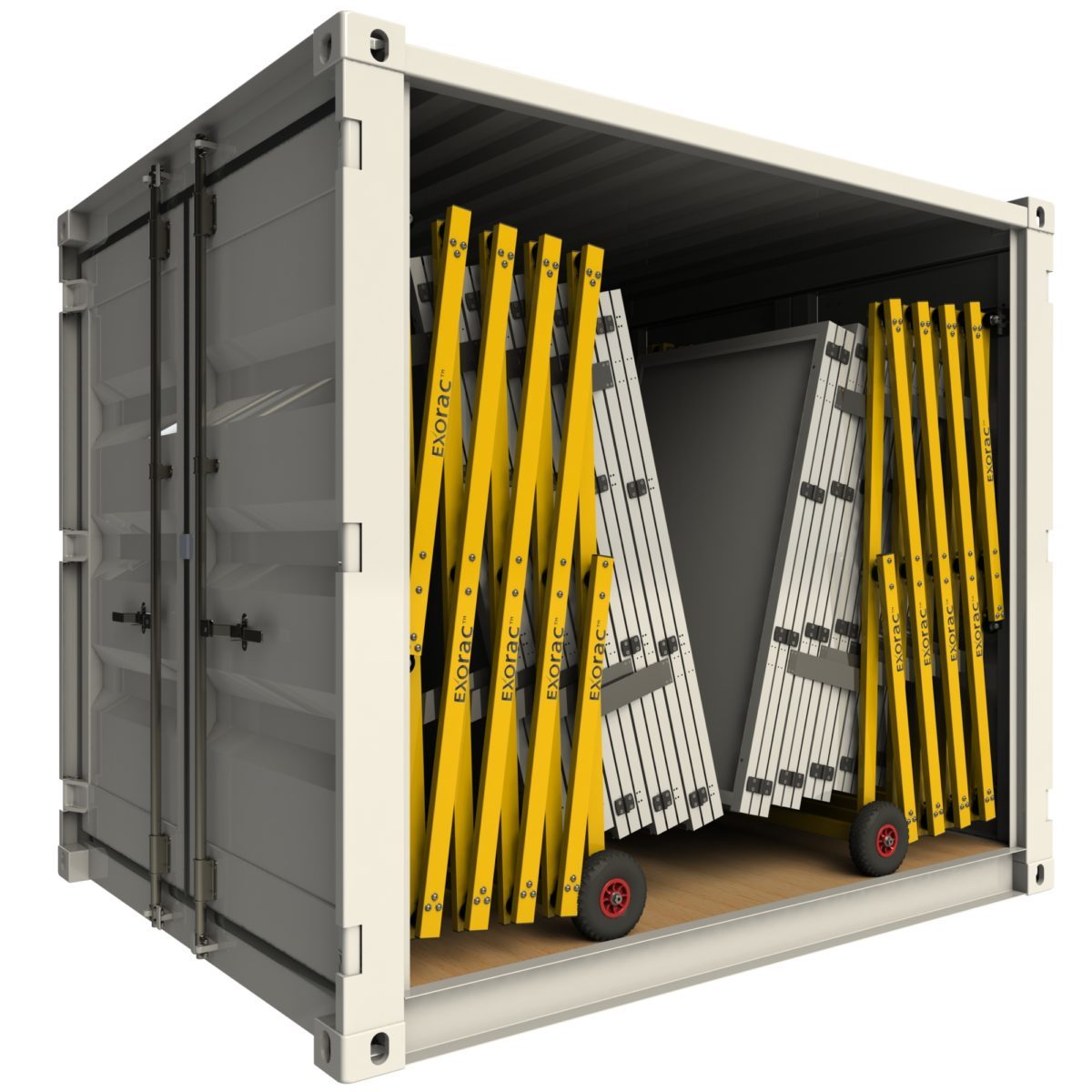From pv magazine Global
Switzerland-based start-up PWRstation has developed a container-based retractable PV system solution that is claimed to allow a large number of solar panels to be deployed very quickly by a single person.
The solution is based on the company’s Exorac Tryptic racking technology which can include two racks able to host up to 30 solar panels. The system can be retracted, tilted and locked into the container, which the manufacturer says protects it from threats such as theft, vandalism or hurricanes.
The racking system is designed in Switzerland at the company’s headquarters, which also manages the suppliers of the components, distributed between Europe and Asia, the routing to the assembly sites and the delivery to customers.

“We are working on a 40-foot container product for the military and emergency response markets, which will offer 100 solar arrays of 3 kW each that can be loaded and unloaded in less than half an hour,” the company’s CEO and founder, Roberto Albertella, told pv magazine.
The price for a tryptic able to host 15 solar modules is CHF 6,350 ($7,050). This price includes 15 lightweight solar panels rated at 375 Wp each. A double-door container can accommodate two tryptics. PWRstation only provides the PV solution, including the Exorac deployment system and solar modules.
The solution is sold to customers that design solutions for power generation, water or air treatment and other applications that require solar energy. It is more complex and more expensive than traditional PV installations, as it is designed to be easily relocated to allow the use of solar energy in locations where a fixed installation is not an option. “Exorac-based systems are suitable for use in the military, to preserve freedom of movement, and in emergency response to quickly deploy a reliable energy source that is not dependent on supply logistics, as is the case with diesel for example,” Albertella further explained.
The mobility of PV implies a good compromise between the costs and weight of the components, he added. “The heavier the modules, the stronger and more expensive the support structure must be. Therefore traditional modules, which are cheap but heavy, may be a less good choice than lightweight modules, which are more expensive but have lower racking costs.”
PWRstation has decided to adopt lightweight and powerful semi-rigid modules and has adapted them to its products in order to achieve the maximum degree of integration and optimisation.
The Swiss start-up has also developed a small six-module unit, called Veetoo, which is intended for use in military deployments of semi-permanent installations of unlimited size or for flat roofs in commercial and industrial applications. “These small six-module units can be folded up in the blink of an eye, allowing for roof maintenance or even total re-roofing, without having to dismantle the PV system,” Albertella emphasised. “More than half of the commercial and industrial roofs are still left unused because of their age, which is an obstacle for non-folding racking systems.”

The company’s main markets are island regions such as the Caribbean for containerised and hurricane-resistant solutions. For the Veetoo product, the US market for commercial and industrial installations with capacities between 300 kW and 2-3 MW is the primary target.
PWRstation has already sold its systems to companies such as Schneider Electric, humanitarian organisations such as UNHCR and delivered a donation installation to Iniciativa Comunitaria in San-Juan (PR) in partnership with Schneider Electric and local partners.
This content is protected by copyright and may not be reused. If you want to cooperate with us and would like to reuse some of our content, please contact: editors@pv-magazine.com.









By submitting this form you agree to pv magazine using your data for the purposes of publishing your comment.
Your personal data will only be disclosed or otherwise transmitted to third parties for the purposes of spam filtering or if this is necessary for technical maintenance of the website. Any other transfer to third parties will not take place unless this is justified on the basis of applicable data protection regulations or if pv magazine is legally obliged to do so.
You may revoke this consent at any time with effect for the future, in which case your personal data will be deleted immediately. Otherwise, your data will be deleted if pv magazine has processed your request or the purpose of data storage is fulfilled.
Further information on data privacy can be found in our Data Protection Policy.